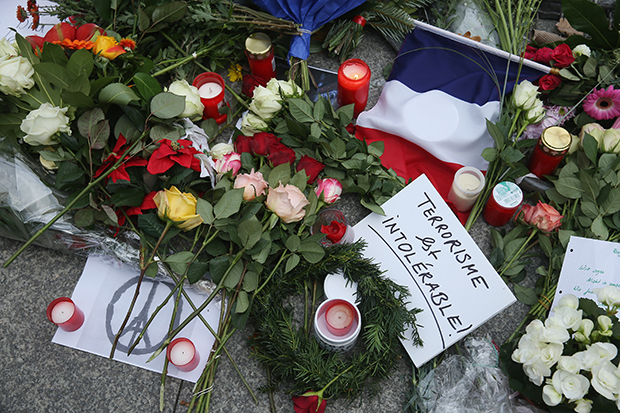Seeing my ten-year-old daughter, Freya, a week after the massacre in Paris, I asked her if she had heard anything about the events there. She said, in a matter-of-fact kind of way, that she had heard something, but didn’t say what it was or from whom she had heard it. All she would say was that it hadn’t been mentioned by her teachers at school. And then she changed the subject. I didn’t feel like saying any more on the matter. Either she didn’t know anything much or she didn’t want to talk about it. And what would have been the point of discussing something so horrible with her? We turned on the television and watched an old Bing Crosby movie instead.
But one of the hot topics of recent days has been what to tell children about this Isis atrocity. It’s a question that has obviously worried Parisians more than anyone else, for most children in Paris can hardly have been unaware that something pretty dreadful had been going on. And I gather from the Times that the general feeling there is that children should not be shielded from the reality. ‘French newspapers and magazines have made particular efforts to explain last week’s terrorist attacks to children, refusing to sugarcoat the barbarity,’ it reported.
Nevertheless, the reaction that made the greatest public impression was shown in a video on French television that was subsequently shared by hundreds and thousands of people online. In this video a six-year-old boy was shown telling his father, a naturalised French Vietnamese, that he was worried because the terrorists ‘have got pistols and they can shoot us because they are very, very bad’. ‘They’ve got pistols,’ the father replied, pointing at the commemorative bouquets in the Place de la République, ‘but we’ve got flowers.’ This moved many people, but it must have puzzled his little son.
I was born in January 1940, shortly after the outbreak of the second world war, and was only five years old when it ended. We lived in the country in Hertfordshire; and although I can’t remember what I knew about the war at the time, I do remember playing with the revolver my mother kept by her bed for use in the event of a German invasion. It wouldn’t have deterred many Germans, but it might at least have been more effective than a flower. Meanwhile, my sisters — both a few years older than me — stuck pins into an effigy of Hitler and made plans to kill him by posting him a parcel of butter laced with rat poison. There was no talk of flowers then.
Pamela Druckerman, an American living with a British husband and their three children in the Paris neighbourhood where the attacks took place, wrote a bestselling book, French Children Don’t Throw Food, about how much better behaved French children usually are than their counterparts in Britain and America; and this, she claimed, was because French parents had a more casual, easygoing approach to their upbringing and let them develop naturally at their own pace. Her own response to the massacre, she wrote in an article for the New York Times, had been to put her children in front of kiddies’ television all day while she tried to work out what to tell them.
This cannot have been easy. The advice on what to tell children in French newspapers and on television had been inspired by the teaching of the late Françoise Dolto, a hugely influential psychoanalyst (the French equivalent of Dr Spock), whose message had been ‘Be honest’, she wrote. Dolto had taught that children didn’t need to be constantly happy, but needed to understand what was going on around them; even when times were hard, parents should tell them the truth.
But Dolto can hardly have imagined events like those this month in the 11th arrondissement, events that even adults are unable to explain. Just answer their questions, advised the editor of one children’s newspaper. But when those questions included ‘Why did the terrorists kill people who hadn’t done anything wrong?’ and ‘Why would they carry out an attack when they were just going to kill themselves afterwards?’, what answers were there to give? Maybe ‘we’ve got flowers’ is as good a response as any.
Got something to add? Join the discussion and comment below.
Get 10 issues for just $10
Subscribe to The Spectator Australia today for the next 10 magazine issues, plus full online access, for just $10.
You might disagree with half of it, but you’ll enjoy reading all of it. Try your first month for free, then just $2 a week for the remainder of your first year.













Comments
Don't miss out
Join the conversation with other Spectator Australia readers. Subscribe to leave a comment.
SUBSCRIBEAlready a subscriber? Log in